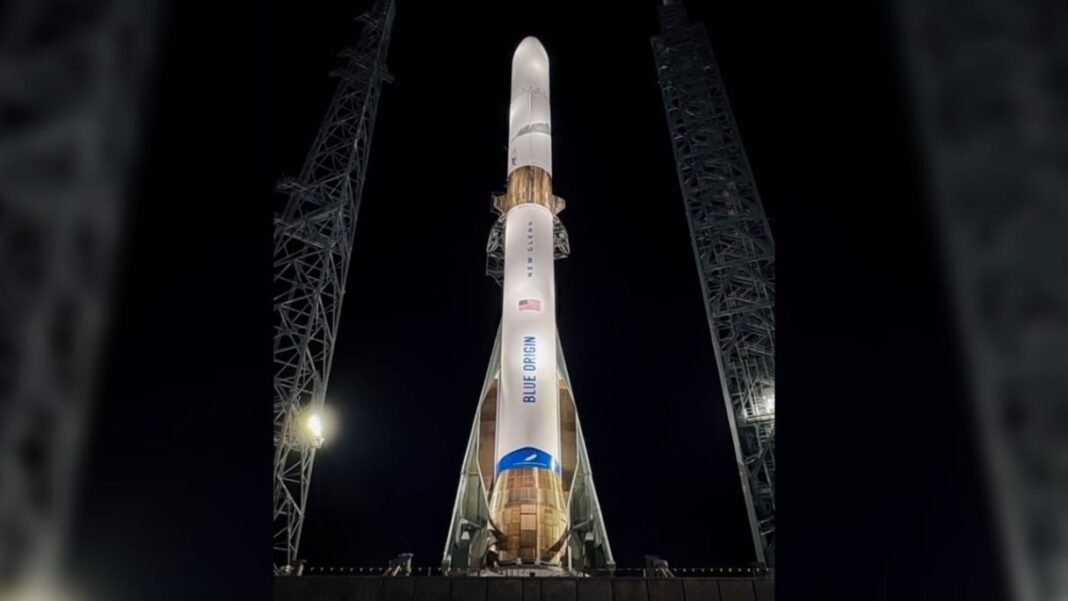Blue Origin New Glenn Rocket Launch Delayed Due to Technical Issue
Jeff Bezos’ space exploration company, Blue Origin, postponed the much-anticipated inaugural launch of its New Glenn rocket after encountering a last-minute technical issue. The launch, initially scheduled for early Monday morning from Cape Canaveral Space Force Station in Florida, was called off as the team encountered a problem with the vehicle’s subsystem, according to Blue Origin’s vice president of in-space systems, Ariane Cornell.
Technical Setback
The New Glenn rocket, standing 320 feet tall and partially reusable, was expected to be a milestone in Blue Origin’s competition with Elon Musk’s SpaceX in the satellite and space exploration sectors. Ariane Cornell announced during a livestream that the decision to stand down came after the issue pushed the launch beyond its planned window.
“We are troubleshooting the vehicle subsystem issue and reviewing the next available launch opportunity,” Cornell stated. She also noted that the team would de-tank and secure the vehicle while assessing the situation to plan for the next attempt.
The New Glenn rocket, named after astronaut John Glenn, is designed to serve both commercial and governmental purposes. Its maiden flight aimed to demonstrate the vehicle’s capacity for payload deployment and orbital maneuvering. The rocket’s first stage was poised to land on the ship Jacklyn, stationed in the Atlantic Ocean, for future reuse, while its second stage was set to carry the Blue Ring spacecraft into orbit.
This mission follows years of development and delays, including initial setbacks caused by unfavorable sea conditions for booster recovery. The New Glenn project is part of Blue Origin’s commitment to sustainable space exploration, incorporating reusable rockets and engines to reduce environmental impact and costs.
A Competitive Landscape
Blue Origin’s delay highlights the challenges of inaugural rocket missions, which often encounter unforeseen technical and logistical issues. Since its founding in 2000, Blue Origin has conducted several successful sub-orbital missions with the New Shepard vehicle, carrying space tourists and marking milestones in reusable rocket technology.
Meanwhile, rival SpaceX has emerged as a leader in the industry, with over 430 successful launches, including frequent deployments of Starlink satellites. Richard Branson’s Virgin Galactic also made headlines by completing its first space tourism missions in 2023.
Future Prospects
Despite the setback, Blue Origin remains committed to its long-term vision of advancing sustainable space technologies. “We aim to protect this planet through the development of reusable rockets and engines,” said Cornell, emphasizing the broader mission to integrate space technology into future sustainability efforts.
The New Glenn rocket, powered by methane-fueled BE-4 engines, also supports United Launch Alliance’s Vulcan rocket, which achieved two orbital flights in 2024. Blue Origin’s efforts to enter the orbital launch market reflect the growing involvement of private companies in what was once the exclusive domain of government space agencies.
Also See:
Also see: Los Angeles Wildfires Destroy Celebrity Homes
Major US Banks Exit Net Zero Alliance Ahead of Trump Presidency
Mayur Bharatbhai, Affordable Lehengas & Shark Tank
L&T Chairman: Remarks on 90-Hour Workweeks Draw Sharp Criticism
—————————————————————
It would mean the world to us if you follow us on Twitter, Instagram and Facebook.




